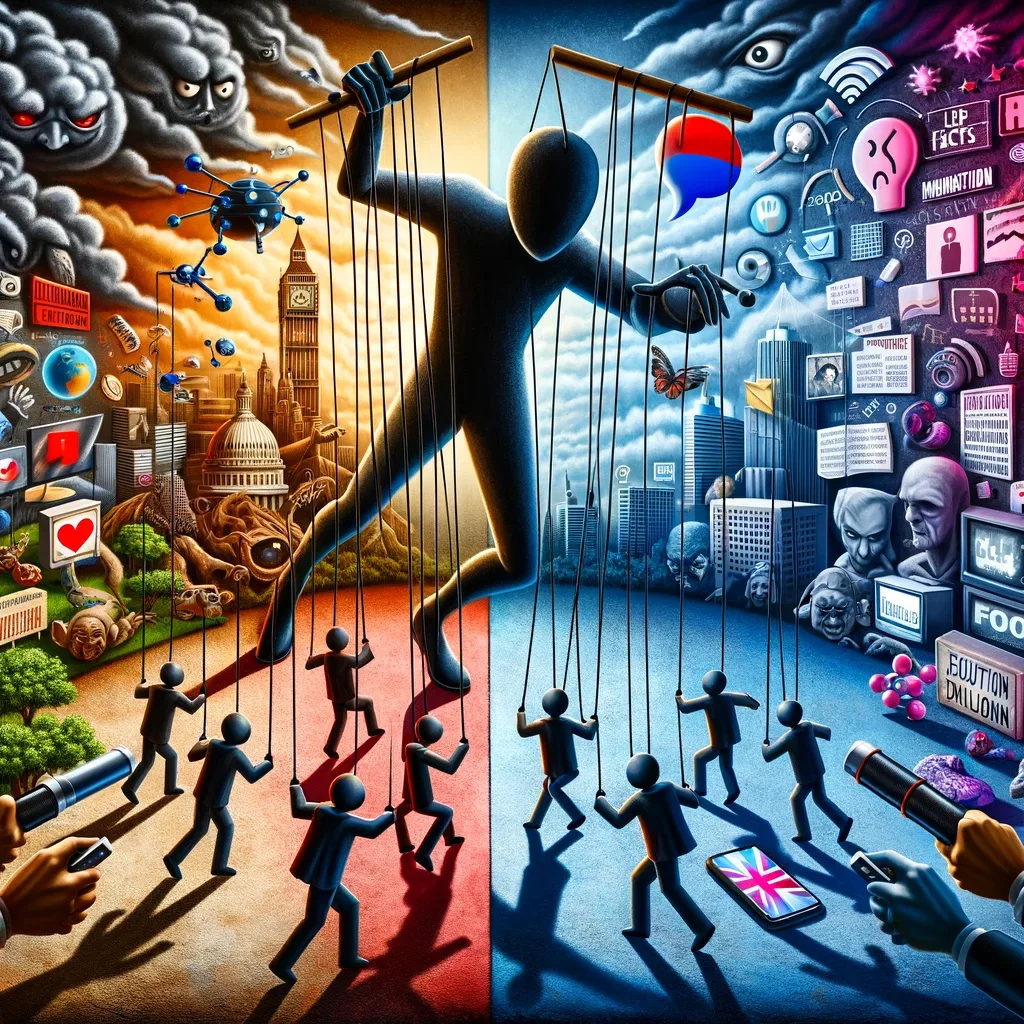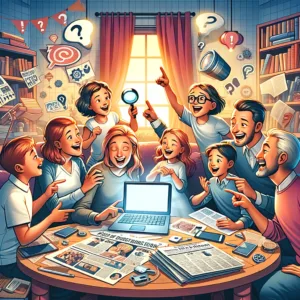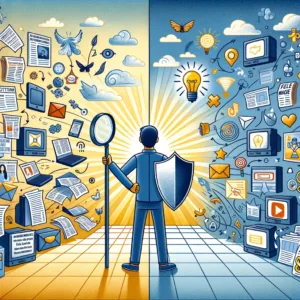
Disinformation refers to the deliberate spread of false or misleading information aimed at deceiving or manipulating people. Unlike misinformation, which is shared without harmful intent, disinformation is created and disseminated with malicious intent, whether to influence public opinion, discredit adversaries, or sow confusion among the population.
By distorting reality and exploiting emotions, disinformation can alter individuals’ perceptions and influence their behavior. This results in exacerbated societal divisions, eroded trust in institutions and traditional media, and increased political polarization. Moreover, disinformation can act as a lever for recruitment into extremist groups by presenting deceptive narratives that exploit individual vulnerabilities or grievances. Young people, in particular, may be susceptible to such tactics, often being more engaged online and potentially less equipped to discern manipulation attempts.
 Many of the great discoveries and influential figures in history owe their achievements to a critical perspective that allowed both scientific and social advancement. This critical approach—questioning established norms, daring to think differently, and relentlessly pursuing truth—has been a fundamental driver behind pivotal moments in history. From Galileo’s astronomical observations challenging the geocentric model, to Marie Curie’s groundbreaking research on radioactivity, critical thinking paved the way for leaps in understanding and innovation. Socially, leaders like Martin Luther King Jr. and Nelson Mandela employed critical thought to envision and advocate for a more just and equitable society, catalyzing significant social change. These examples underscore that critical thinking is not just an academic skill but a transformative force that has propelled humanity forward, fostering discoveries and societal advancements that have reshaped our world.
Many of the great discoveries and influential figures in history owe their achievements to a critical perspective that allowed both scientific and social advancement. This critical approach—questioning established norms, daring to think differently, and relentlessly pursuing truth—has been a fundamental driver behind pivotal moments in history. From Galileo’s astronomical observations challenging the geocentric model, to Marie Curie’s groundbreaking research on radioactivity, critical thinking paved the way for leaps in understanding and innovation. Socially, leaders like Martin Luther King Jr. and Nelson Mandela employed critical thought to envision and advocate for a more just and equitable society, catalyzing significant social change. These examples underscore that critical thinking is not just an academic skill but a transformative force that has propelled humanity forward, fostering discoveries and societal advancements that have reshaped our world.
 Role of Algorithms
Role of Algorithms
The algorithms of social media and search platforms play a crucial role in the dissemination of information online, including disinformation. These algorithms are designed to maximize user engagement by recommending content likely to capture their attention. Unfortunately, this approach can promote the spread of sensational, polarizing, or false content, as such content tends to generate strong emotional reactions, thereby increasing engagement. Algorithms do not always distinguish between verified information and disinformation, which can lead to unintentional amplification of the latter.
 Media Education
Media Education
In this context, media education becomes essential. It aims to equip individuals from an early age with the necessary skills to navigate today’s complex media landscape critically and consciously. Media education encompasses digital literacy, source verification, and the development of critical thinking. It enables individuals to:
- Identify disinformation: Recognize common features of disinformation, such as misleading headlines designed to deceive.
- Evaluate sources: Verify the reliability of information sources by seeking confirmations from different sources and examining the evidence supporting the claims.
- Cultivate critical thinking: Develop the ability to constructively question received information, understanding the context, recognizing potential biases, and evaluating evidence.
Source Verification and Critical Thinking
Source verification and the development of critical thinking are key components of media education. They enable individuals not to passively accept presented information but to actively engage in assessing its reliability and accuracy. This is especially important in an online environment where disinformation can easily spread.
Developing critical thinking in children is an indispensable skill for their future. Critical thinking helps them judiciously evaluate information, recognize biases, and seek reliable sources. This prepares them not only to counter disinformation but also fosters their development as independent and responsible thinkers. By nurturing critical thinking, children learn to ask essential questions, analyze arguments, and make informed decisions. This ability is crucial not only for their engagement as informed and active citizens but also for their success in an increasingly information- and technology-dominated professional world.
The goal is to develop in children and adolescents a skeptical and questioning approach to information consumption, which is indispensable for confidently navigating the digital era.
Media Education in the Family
Media education and the learning of critical thinking within the family offer a unique opportunity to strengthen family bonds, turning this educational endeavor into a fun and collaborative activity. By tackling the challenges of disinformation and digital literacy together, families can encourage open discussion, share perspectives, and solve problems collectively. This creates an environment conducive to mutual learning and understanding, where parents and children explore the complex media landscape together. By turning media education into a game, families can make the subject less intimidating, making learning both fun and engaging while developing essential critical skills.

Family Media Education Game
Objective: Develop critical thinking and digital literacy in a fun and engaging way.
Required Materials: Internet access, paper, pencils, and a list of varied information sources (news sites, blogs, videos, etc.).
How to Play:
- Content Selection: Parents prepare a selection of varied content in advance, including both reliable information and disinformation. This content can cover current events, scientific anecdotes, unusual stories, etc.
- Player Roles: Each family member plays the role of a media detective, whose mission is to unravel the truth from falsehood.
- Investigation Phase: Together, the family examines each piece of content. Each detective asks questions like: “Who is the author of this information?”, “What are the sources?”, “Does this content evoke a strong emotional reaction? Why?”, “Can we find confirmation or denial of this information?”.
- Deliberation: After discussing and investigating, each detective presents their conclusions on the information’s reliability, justifying their reasoning.
- Verification: The family collectively verifies the validity of the information by seeking confirmations from different sources.
- Scoring: Points are awarded for correctly identifying reliable information and disinformation, as well as for particularly insightful reasoning.
Why Play This Game?
This game can significantly contribute to improving the self-confidence of children and adolescents. Here are several reasons explaining this positive impact:
- Valuing Personal Contributions: By actively involving children in the information evaluation process, this game recognizes and values their opinions and thoughts. When they share their ideas, and these are taken seriously by other family members, it reinforces their sense of importance and competence
- Development of Critical Skills: The investigative and critical analysis process helps children develop essential skills such as analytical thinking, problem-solving, and informed decision-making. Mastering these skills makes them feel better equipped to navigate not just the media landscape but also various everyday life situations, thereby boosting their confidence in their own abilities.
- Encouraging Curiosity and Continuous Learning: The game prompts children to ask questions, actively seek information, and be curious about the world around them. This mindset of continuous learning feeds their confidence in their ability to learn and adapt, key elements of self-confidence.
- Experience of Success: Correctly identifying reliable information or uncovering disinformation gives children moments of success that bolster their self-confidence. Even small victories show them that they can have a positive impact and that they are capable of discernment.
- Strengthening Family Bonds: Playing the game as a family creates a supportive environment where children feel safe to express their ideas and make mistakes. This atmosphere encourages intellectual risk-taking in a caring setting, which is essential for developing self-confidence.
- Constructive Management of Failures: The game also teaches children to manage mistakes or failures constructively. Recognizing that it’s normal not to always be right and learning from errors are crucial aspects of building resilient self-confidence.

Conclusion
In conclusion, media education and the early development of critical thinking skills are powerful tools to prepare children for a world increasingly saturated with information and disinformation. By actively involving families in this learning process through games and interactive activities, we not only bolster the critical skills of the young but also strengthen family bonds and build their self-confidence.
Media education and the development of critical thinking play a crucial role in fostering open-mindedness, curiosity, empathy, and the discovery of the world. By teaching children to critically evaluate information, we encourage them to explore beyond their immediate surroundings, to question established ideas, and to understand diverse perspectives. This approach stimulates curiosity, leading to continuous research and learning, paving the way to a richer and more nuanced understanding of the world around us. Moreover, by recognizing the complexity of situations and the multitude of viewpoints, children develop a deeper empathy for the experiences and lives of others.
 Role of Algorithms
Role of Algorithms Media Education
Media Education